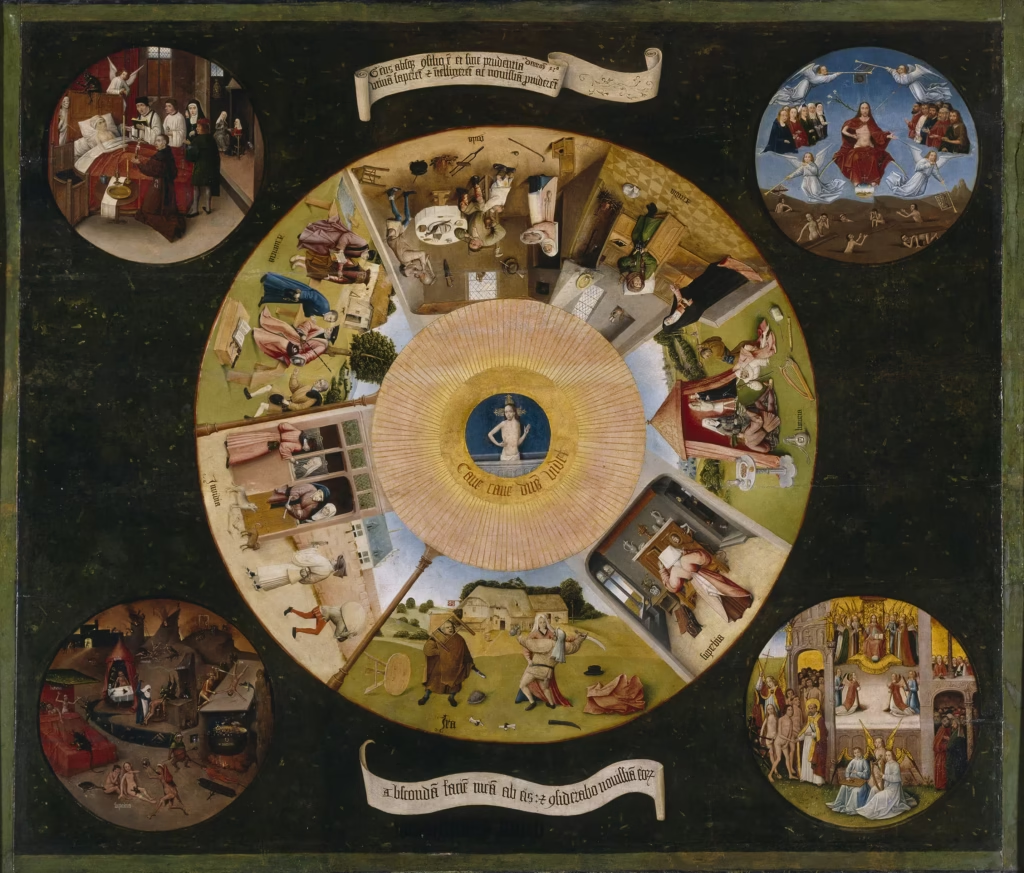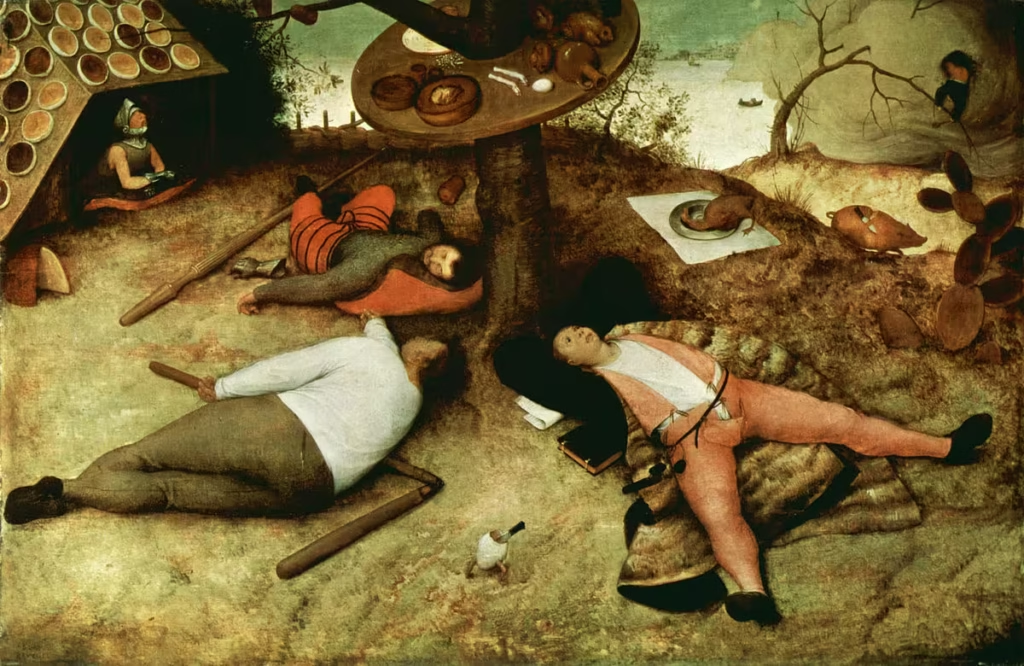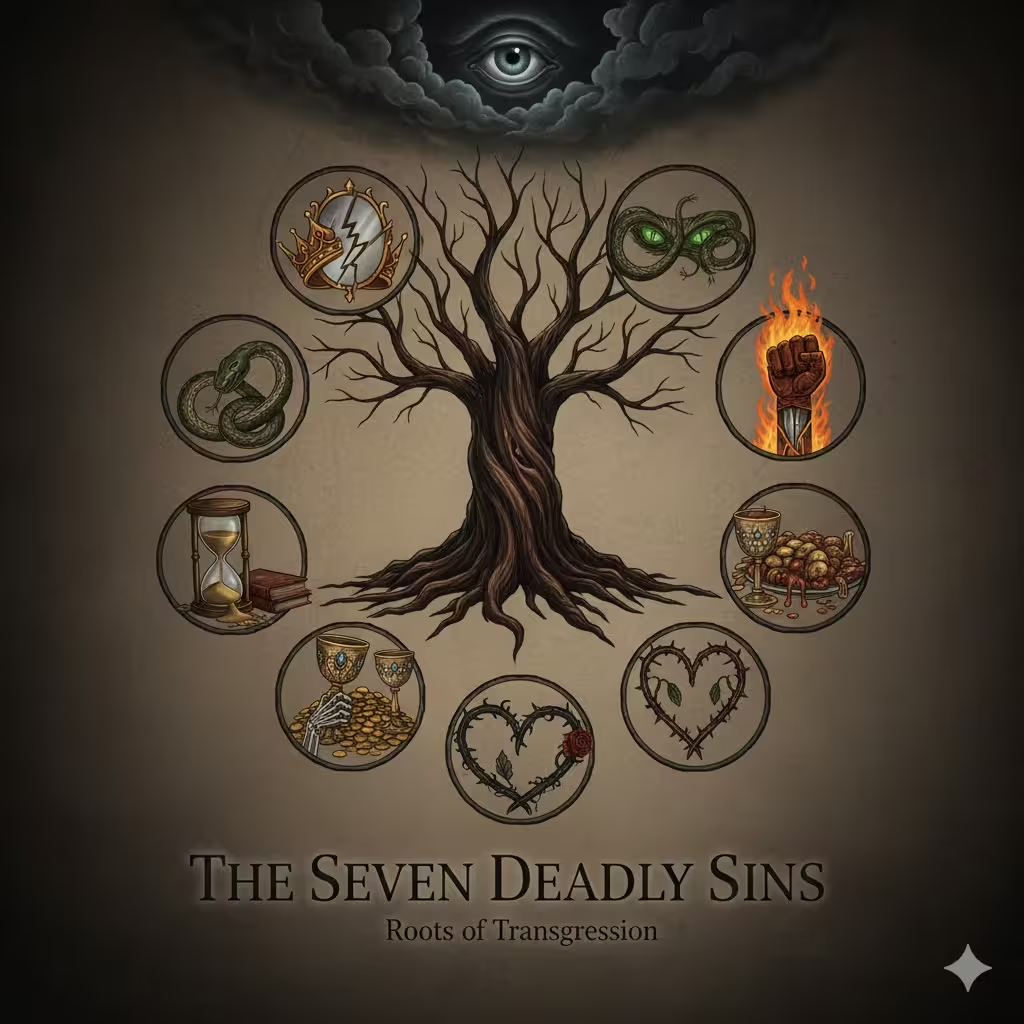The Seven Deadly Sins: An Ultimate Biblical Guide to Spiritual Warfare
The concept of the seven deadly sins—or more accurately, the seven cardinal vices—has profoundly influenced Western culture, art, and moral thought for over 1,600 years. While the Bible does not contain a single, numbered list of these seven sins, they are a powerful classification of the root evils that drive all human transgression. Understanding the seven deadly sins is crucial for believers because they expose the fundamental internal battles we face daily.
This comprehensive guide will explore the history of the seven deadly sins, trace their roots through scripture, contrast them with the fruit of the Spirit (God’s antidote to the vices), and provide a biblical framework for overcoming them. This study will equip you with a spiritual blueprint for recognizing and defeating the flesh’s deepest desires.

The History and Theological Roots of the Seven Deadly Sins
The list of the seven deadly sins was not compiled by a biblical author, but by early Christian ascetics and theologians seeking a practical way to categorize and combat the primary spiritual struggles of humanity.
From Eight Vices to Seven Sins
The original system was developed in the 4th century by Evagrius Ponticus, an Egyptian monk. He identified eight evil thoughts, or “logismoi,” which he believed were the main obstacles to spiritual maturity. His list included: Gluttony, Lust, Avarice, Sadness, Anger, Acedia (spiritual sloth/listlessness), Vainglory, and Pride.
A century later, in the 6th century, Pope Gregory I (Gregory the Great) revised this list for a more practical, pastoral application. He condensed the list from eight to seven, notably merging acedia (sadness/sloth) and vainglory into pride, and repositioning the final list to the order we recognize today: Pride, Envy, Wrath, Sloth, Avarice (Greed), Gluttony, and Lust. This list of the seven deadly sins became the definitive moral framework for medieval Christian instruction, shaping confession and theological education for centuries.
Why They Are “Deadly”
The term “deadly” does not mean that committing one of these sins automatically sends a person to hell. Instead, it means these sins are capital vices—root sins from which many other smaller transgressions spring. If left unchecked, these seven vices corrupt the soul, kill spiritual vitality, and sever the believer’s fellowship with God. They are destructive spiritual diseases that lead to spiritual death if not addressed through repentance and the Holy Spirit. They are “deadly” because they attack the very foundation of the soul’s relationship with God.
The Seven Deadly Sins in Scripture: Roots of Transgression
Although the seven deadly sins do not appear as a numbered list in the Bible, each one is explicitly and severely condemned throughout the Old and New Testaments. Scripture confirms that these seven categories cover the core temptations of the human heart, revealing the Bible’s practical wisdom for identifying the sources of sin.
1. Pride (Superbia)
Theological Definition: Pride is excessive self-esteem, the belief that one is superior to God and others. It is the root of all sin, defined as placing one’s own will and glory above the Creator’s. Pride is the original sin, marking the fall of Lucifer and the failure of Adam and Eve.
- Biblical Root: Pride led to Satan’s fall (Isaiah 14:12-15) and was the core temptation in the Garden of Eden: “You will be like God” (Genesis 3:5). It is the ultimate rejection of divine authority.
- Scripture’s Warning: Proverbs 16:18 warns, “Pride goes before destruction, and a haughty spirit before a fall.” God actively opposes the proud and offers His grace only to the humble (James 4:6). This sin prevents repentance, as a proud heart sees no need for a Savior.
2. Envy (Invidia)
Theological Definition: Envy is sorrow or discontent over the good fortune or possessions of others, combined with a consuming desire to possess them oneself. It is a sin of comparison and covetousness that attacks the concept of God’s sovereign provision.
- Biblical Root: Envy drove Cain to murder his brother Abel because God favored Abel’s offering (Genesis 4:5-8). In the New Testament, Envy was the motivation that led the chief priests to hand Jesus over to be crucified (Mark 15:10), showing its profound power for destruction.
- Scripture’s Warning: Romans 13:13 warns against envy, and James 3:16 states, “For where jealousy and selfish ambition exist, there will be disorder and every vile practice.” Envy poisons community and fellowship, replacing love with resentment.

3. Wrath (Ira)
Theological Definition: Wrath is excessive and uncontrolled feelings of hatred and anger, often leading to aggression, abuse, or a desire for vengeance. It is a failure to control one’s emotional state, mirroring the chaos of the flesh.
- Biblical Root: While righteous anger exists (Jesus cleansing the Temple), unrighteous wrath is destructive. Examples include King Saul’s violent fits of jealousy toward David, showing how unchecked anger leads to tyranny and cruelty.
- Scripture’s Warning: Ephesians 4:26 advises, “Be angry and do not sin,” setting the standard that anger must be subject to moral control. James 1:20 warns that “the anger of man does not achieve the righteousness of God.” This sin is a failure to exercise the fruit of the Spirit (specifically patience and peace).
4. Sloth (Acedia)
Theological Definition: Sloth is not mere physical laziness; it is spiritual apathy, a lack of diligence, and a refusal to exert oneself toward spiritual or moral growth. It is a deep-seated listlessness and dullness of the soul.
- Biblical Root: The parable of the talents condemns the slothful servant who, out of fear and spiritual negligence, failed to use what he was given (Matthew 25:26). The book of Proverbs frequently warns against the danger of neglecting duty, wisdom, and preparation for the future (Proverbs 6:9-11).
- Scripture’s Warning: The greatest danger of sloth is that it allows the spiritual life to atrophy, leading to a neglect of prayer, scripture study, and service. Jesus warned that the love of many growing cold is a manifestation of this spiritual apathy (Matthew 24:12).
5. Avarice (Avaritia / Greed)
Theological Definition: Avarice is an excessive, insatiable desire for wealth, possessions, or material gain. It is the idolatry of money and resources, placing temporal goods above eternal values.
- Biblical Root: Greed led to Judas Iscariot betraying Jesus for 30 pieces of silver. It condemned Ananias and Sapphira for withholding money and lying to the Holy Spirit (Acts 5:1-11). It is a heart condition that places absolute trust in money.
- Scripture’s Warning: 1 Timothy 6:10 famously calls the “love of money is a root of all kinds of evil.” Jesus warned, “You cannot serve God and money” (Matthew 6:24). This sin is the antithesis of the goodness and generosity required of a follower of Christ.
6. Gluttony (Gula)

Theological Definition: Gluttony is excessive consumption or indulgence, often related to food or drink, but also includes self-indulgence to the point of waste, drunkenness, or prioritizing physical appetite over spiritual life. It is the failure to properly steward one’s body and resources.
- Biblical Root: Esau carelessly traded his spiritual birthright for a bowl of stew, demonstrating a willingness to sacrifice the eternal for the immediate, physical appetite (Genesis 25:34). This elevated the immediate craving above God’s divine promise.
- Scripture’s Warning: Philippians 3:19 describes those whose “god is their stomach.” The New Testament calls the body a temple of the Holy Spirit, demanding temperance and self-control (1 Corinthians 6:19). Gluttony is a failure of Christian stewardship.
7. Lust (Luxuria)
Theological Definition: Lust is an intense, improper desire, particularly sexual desire, that violates moral law and dishonors the body. It is the objectification of another person or an obsession with physical pleasure.
- Biblical Root: Lust led King David to commit adultery and murder (2 Samuel 11). Jesus elevated the standard of the Law, stating that to look at a woman with lust has already committed adultery in the heart (Matthew 5:28). This makes the sin a matter of the internal will, not just external action.
- Scripture’s Warning: 1 Thessalonians 4:3-5 commands believers to control their bodies “in holiness and honor, not in the passion of lust like the Gentiles who do not know God.” It is a fundamental attack on the sanctity of human relationships and the divine image.
The Bible’s Antidote: The Fruit of the Spirit
The most powerful and effective method for overcoming the seven deadly sins is not by fighting them one by one through sheer willpower, but by cultivating the divine character traits of the fruit of the Spirit (Galatians 5:22-23). The fruit is the active, spiritual cure for the vices.

The fruit of the Spirit works because it is a spiritual response, not a human effort. Where the seven deadly sins are the chaotic “works of the flesh” (Galatians 5:19), the fruit is the singular, unified product of the Holy Spirit (Galatians 5:22). You cannot conquer Pride with discipline alone; you must cultivate the opposite virtue—humility—through surrendering to the Spirit.
Theological and Historical Context of the Vices
The discussion of the seven deadly sins is incomplete without placing it into the wider context of salvation and human nature. This demonstrates the necessary scholarly depth.
The Role of Thomas Aquinas and Cardinal Virtues
The theology of the seven deadly sins reached its pinnacle through the work of Thomas Aquinas (13th century). He integrated the seven vices with the classical Greek and biblical virtues, creating a balanced moral theology that remains influential today.
- The Cardinal Virtues: Prudence, Justice, Temperance, and Fortitude (Wisdom/Courage) were affirmed by the Church as essential moral habits necessary for civil and personal well-being.
- The Theological Virtues: Faith, Hope, and Love (Agape) were considered the specifically divine graces given by God.
Aquinas taught that the only way to defeat the seven deadly sins was to actively develop these virtues, particularly the theological virtue of Love (Agape), which acts as the crown and source of all other virtues and is the direct counter to Pride. His systematic approach provided a clear framework for analyzing the psychological damage inflicted by these vices.
Understanding the Root Sin: Pride (Superbia)
Theological tradition holds Pride as the original and most serious of the seven deadly sins. It is the ultimate rejection of God’s authority, making it the most dangerous spiritual poison.
- Pride vs. Humility: True humility is the realization that everything good comes from God (James 1:17). Pride, conversely, claims that success, power, and righteousness originate from oneself.
- Spiritual Death: Pride is so deadly because it makes repentance impossible. If a person believes they are already elevated and self-sufficient, they see no need to bow down to Christ or accept His unmerited grace. Therefore, defeating Pride is the first and most critical step in spiritual freedom and the beginning of all genuine Christian life.
The Consequence of Sin: The Seven Deadly Sins and Hell
The gravity of the seven deadly sins is most clearly understood by examining their ultimate spiritual consequence: separation from God.
The Scriptural Warning of Judgment
While these vices are not a checklist for losing salvation, Paul warned the Galatians that “those who practice such things will not inherit the kingdom of God” (Galatians 5:21). This is a solemn warning against a lifestyle dominated by the works of the flesh. The danger is not a single failure but a practice—a continuing, unrepentant pattern of life defined by one of the seven deadly sins.
- Sin as Idolatry: Sins like Avarice (Greed) and Lust are often equated with idolatry in scripture (Colossians 3:5; Ephesians 5:5). By allowing these vices to rule the heart, the believer effectively dethrones God and installs their own desire as their god, severing the foundational relationship of the soul.
- The Necessity of Repentance: The Bible teaches that genuine faith in Christ includes repentance—turning away from sin. The battle against the seven deadly sins is the daily process of sanctification, which is the necessary proof of a saving faith.
Practical Frameworks for Overcoming the Seven Deadly Sins
Defeating the seven deadly sins requires a strategic and proactive spiritual life. The struggle is continuous (sanctification), but victory is promised through Christ.
1. Identify the Besetting Sin
Most individuals are not equally tempted by all seven deadly sins. Many people have one besetting sin (Hebrews 12:1) that serves as their primary root of failure. Identifying this chief vice—be it Sloth (procrastination and inaction) or Lust (misdirected desire)—is the first step toward victory. This requires honest self-assessment, often best done through confession and accountability.
2. Cultivate the Opposite Virtue
The strategy of the fruit of the Spirit is to replace a vice with its corresponding virtue. This is the replacement principle: you can’t just remove sin; you must replace it with something divine.
| Sin to Avoid | Virtue to Cultivate | Biblical Focus |
| Pride | Humility | For those who exalt themselves will be humbled (Matthew 23:12). |
| Envy | Contentment/Kindness | Rejoice with those who rejoice; Mourn with those who mourn (Romans 12:15). |
| Wrath | Patience/Gentleness | Be quick to hear, slow to speak, slow to wrath (James 1:19). |
| Sloth | Diligence/Faithfulness | Work heartily, as for the Lord and not for men (Colossians 3:23). |
| Greed | Generosity/Goodness | Give cheerfully; lay up treasures in heaven (Matthew 6:20). |
| Gluttony | Self-Control/Temperance | Rather, discipline yourself for the purpose of godliness (1 Timothy 4:7). |
| Lust | Self-Control/Purity | Flee from sexual immorality; honor God with your body (1 Corinthians 6:18-19). |
3. The Power of Confession and Accountability
The seven deadly sins thrive in secrecy. Confession breaks the power of sin by bringing it into the light. James 5:16 commands us to confess our sins to one another and pray for one another, “that you may be healed.” Accountability with trusted spiritual mentors is an essential defense against the isolation that allows these vices to take root and destroy the soul.
Frequently Asked Questions About the Seven Deadly Sins
1. Are the Seven Deadly Sins listed in the Bible? No, the specific list of seven—pride, envy, wrath, sloth, greed, gluttony, and lust—does not appear in a single passage in the Bible. The list was formulated by early Christian theologians, most notably Pope Gregory I in the 6th century, as a way to categorize the root vices that lead to other sins. However, each of the seven sins is individually condemned throughout Scripture.
2. What makes these sins “deadly”? The term “deadly” (or capital) means these sins are foundational vices from which all other sins spring. If left unaddressed, they can lead to spiritual death by corrupting the soul, destroying one’s relationship with God, and preventing repentance. They are not “deadly” in the sense that a single act guarantees damnation, but rather that a lifestyle dominated by them is spiritually destructive.
3. Which of the seven deadly sins is the worst? Theologically, Pride is considered the root and most serious of the seven deadly sins. It is seen as the original sin that led to Lucifer’s fall and the sin that makes repentance impossible. A proud heart feels no need for God’s grace, making it the ultimate barrier to a relationship with Him. Proverbs 16:18 states, “Pride goes before destruction.”
4. How can I overcome the seven deadly sins? The biblical antidote to the seven deadly sins is not just willpower, but cultivating the Fruit of the Spirit (Galatians 5:22-23) through a relationship with Christ. This involves identifying your primary “besetting sin,” actively practicing the opposite virtue (e.g., fighting pride with humility, greed with generosity), and engaging in spiritual disciplines like confession, accountability, and prayer.
Conclusion: Walking Free From the Root of Sin
The seven deadly sins are a powerful diagnostic tool, helping us identify the spiritual diseases that threaten our soul. While these vices are deeply rooted in the human flesh, the Bible provides a clear, divine antidote: the fruit of the Spirit. The answer to overcoming the seven deadly sins is not found in human willpower or legalistic effort, but in the miraculous, transforming power of the Holy Spirit.
By choosing daily to walk in the Spirit and actively cultivating love, joy, peace, patience, kindness, goodness, faithfulness, gentleness, and self-control, the power of the flesh is broken, and a life of true freedom is realized. The study of the seven deadly sins ultimately points us back to Christ, who offers both the forgiveness that deals with our past sins and the spiritual power that enables us to overcome them today.
- To understand God’s ultimate antidote to the seven deadly sins, read our guide on the Fruit of the Spirit.
- For a historical foundation, delve into the theological roots of Pride and Grace in our article on The Meaning of Grace in the Bible.
- To understand the role of Love in defeating the vices, explore our article What Does God Say About Love.



